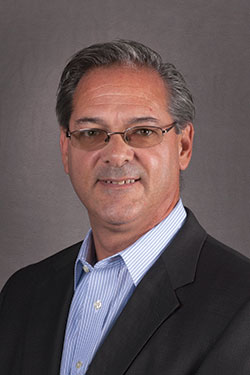Craig Newton, Supplies on the Fly
Craig Newton’s career in the foodservice industry started back in 1987, when his father, who was a manufacturers’ rep, suggested he work for an equipment dealership. He was hired as an assistant and worked at the dealership for 10 years. Newton then became a manufacturers’ rep himself, where he gained another decade of experience in the field. “It gave me a good background on another side of the industry,” he says.
 Craig NewtonIn 2007 Newton returned to the dealer side as a foodservice equipment specialist with Sysco, which was one of his clients while he was a rep. Two years ago, he moved over to Supplies on the Fly, a division of Sysco, in the same role. His client roster consists mainly of independent restaurants. He also specializes in heavy equipment.
Craig NewtonIn 2007 Newton returned to the dealer side as a foodservice equipment specialist with Sysco, which was one of his clients while he was a rep. Two years ago, he moved over to Supplies on the Fly, a division of Sysco, in the same role. His client roster consists mainly of independent restaurants. He also specializes in heavy equipment.
Q: You’ve been in the foodservice industry for 32 years. How has the equipment evolved during that time?
A: Equipment has evolved a lot during that time. More so, it has changed in terms of the energy efficiency aspect of it, with all the major manufacturers being Energy Star rated and dishwashers using much less water than they did years ago. This has been big, as well as the introduction of combi ovens and high-speed cooking technology.
Q: What’s your secret to successfully managing projects that involve coordinating countless details with foodservice designers, factories and more?
A: I manage projects by taking copious notes and listening to the customer, then just try to cover all the many details involved between architects and general contractors. I think about what might be missed and what the customer may have overlooked in something they specified. I will ask customers, “What do you think about this?” or “What about this option?” It’s important to be thorough and cover all your bases.
Q: How has the industry evolved for the better since you first started?
A: I think it goes back to the more energy-efficient equipment. Fortunately, today’s equipment is pretty much idiot proof with regard to the technology of conventional and combi ovens. Even with high-speed cooking, units are made easy to use, which is good because it’s tough for restaurants to find skilled help these days.
Q: Projects often come with tight budgets or timelines. What’s one good way to address these challenges without compromising the project’s quality?
A: Timelines are tough, as customers can have unrealistic expectations. A good way to adjust the budget is to look for ways to value-engineer without sacrificing quality. As far as tight timelines, I try to steer customers toward items that don’t have long lead times and give them the pluses and minuses at the get-go. Generally, in the very beginning of a large project, I try to be up front with people and give them a realistic expectation on what it takes to get the project completed.
Q: What’s the most important thing to do when building solid working relationships with members of the supply chain — designers, reps and so on?
A: It’s knowing who to call for the right answers in any situation. I’ve been in this market so long that I know the key players, but it’s also about staying in touch and face-to-face meetings. We help each other out with new projects or spec help. I know these supply chain members will be there for me when I need them.
Q: What’s the most important lesson you’ve learned during your career?
A: The most important lesson I would say is just being truthful and up front with my customers and knowing my limitations and when to reach out for help. It is important to earn a customer’s trust and respect.



